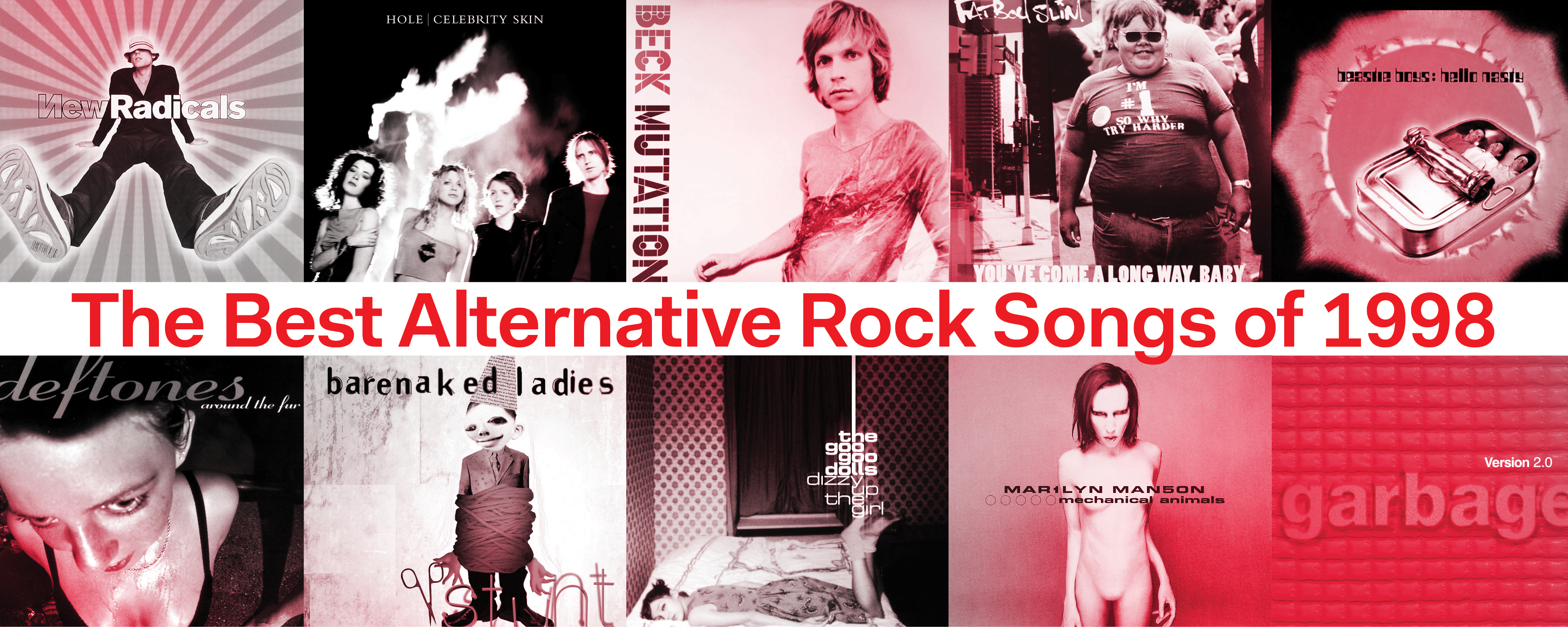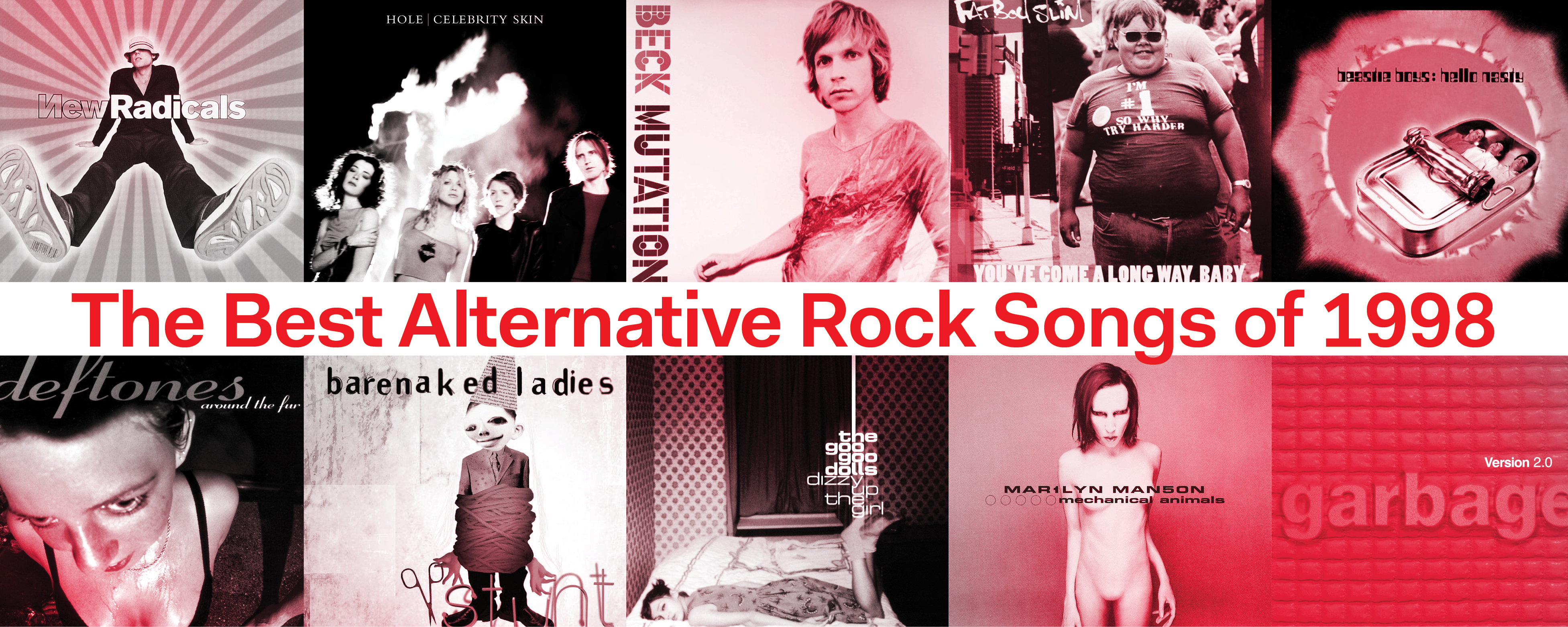60. Drugstore – “El President” (ft. Thom Yorke)
The dreampop act Drugstore’s wild second album White Magic For Lovers remains one of 1998’s most underheralded releases, with spectral songs given extra wonder by Ian Burdge’s churning cello and frontwoman Isabel Monteiro’s spindly vocals. “El President,” the album’s whirling lead single, showcases both of those elements in a startling yet beautiful way. Its lyrics address the 1970 coup d’etat of Chilean president Salvador Allende, with a fever-dream quality that was well-suited to the paranoiac voices of Monteiro and her duet partner, Thom Yorke. “I wanted someone with a very pure, neutral voice of goodness,” Monteiro told Rock Sucker in 2011. “He fitted the brief perfectly.” —MJ
59. Tonic – “Open Up Your Eyes”
I can’t really pinpoint the moment where alt-rock radio hits tilted from a tone of semi-detached irony to an embarrassing earnestness, but Tonic’s “Open Up Your Eyes” is a great example of the latter, driven home by singer Emerson Heart’s gravelly vocals. The video grants some much-needed levity to the song’s heavy-handed lyrical platitudes, playing like a bingo card of ‘90s tropes: a celebrity cameo in Mick Fleetwood, several goatees, oblique references to Jewel and Fiona Apple, and some unsubtle commentary on the cookie-cutter nature of suburbia. Unfortunately, the song isn’t as effective as its visuals. —MS

Also Read
The Year in 1998 Alternative Rock
58. Barenaked Ladies – “It’s All Been Done”
As the other Barenaked Ladies song from 1998, “It’s All Been Done” is a more melodic, anthemic counter to the goofy irreverence of “One Week.” It sounds a bit like the soundtrack to a trailer for a lighthearted campus comedy from the same era, and is bright and bouncy enough to hold your attention in the same manner as the sort of film it might advertise. Though “It’s All Been Done” might be more earnest than its more famous counterpart, its propulsive singalong “woo-hoo-hoos” didn’t quite nudge out all of the band’s absurdist tendencies. “Alone and bored on a thirtieth-century night,” Stephen Page sings. “Will I see you on The Price Is Right?” Two Decades haven’t brought us any closer to figuring out what he meant. Maybe we really do need to wait until the year 2901. —ID
57. Tori Amos – “Spark”
Two days before Christmas 1996, Tori Amos lost a pregnancy. In the horrific aftermath, she found solace in her muses, writing the songs that would make up her fourth album From the Choirgirl Hotel. Its expansive palette was a shift away from the woman-at-piano ideal she’d cultivated (“I mean, I have wrung that one dry!” she told SPIN in 1998), but it doubles down on the compositional inventiveness and imagistic writing. “Spark,” the album’s lead single, paints a spiky, woozy portrait of her miscarriage and its emotional aftermath. Its shifting meter reflects the confusion and despair of its lyrics, which confront ideas of divine intervention and female strength. —MJ
56. Depeche Mode – “Only When I Lose Myself”
The mid-to-late 90s were a difficult time for new wave pioneers Depeche Mode. Like New Order, they successfully adapted to the times at the start of the decade, adopting an even darker sound to fit in with the new crop of grunge bands. But they hit a speed bump in 1996 after singer Dave Gahan was sent to court-ordered rehab after nearly dying from an overdose of heroin and coke. The band still put out a successful album, 1997’s Ultra, but didn’t tour because of the obvious personnel turmoil. In the meantime, they released a collection of singles featuring the new song “Only When I Lose Myself.” It’s not Depeche Mode’s most remarkable offering, but it did serve as a foundation for a slew of great remixes from the likes of Dan the Automator and Gus Gus. —MS
55. Liz Phair – “Polyester Bride”
Flipping musical ideals on their heads was Liz Phair’s stock in trade, and her third album’s lead single was no different. It was a reinvention of the watering-hole singalong as an opportunity to take stock of one’s life, nudged along by a helpful, slightly besotted bartender who balanced exasperation with encouragement while guiding her away from “those kind of men.” You know, the ones who were available for the kind of box-ticking relationship that would eventually leave her seeking her thrills at shoe sales. “Polyester Bride” glides along the way long conversations at cozy bars do, then eventually tumbles to a stop as Phair realizes that her future lies elsewhere. —MJ
54. Pulp – “Help the Aged”
At the Tibetan Freedom Concert in June 1998, Jarvis Cocker kicked off his shoes and launched into several songs from This is Hardcore that fell on the crowd like acid rain. The despondent “The Fear” wasn’t supposed to be played at an occasion like this; This is Hardcore wasn’t supposed to be the follow-up to Different Class. But that’s our Jarvis, the sulker at the party who anticipates the hangover while helping himself to another Tanqueray and tonic. “Help the Aged” was in that vein: a precise, compassionate look at our grandparents that’s also laced with narcissism, because “someday we’ll be older too.” —AS
53. Sheryl Crow – “My Favorite Mistake”
“My Favorite Mistake” comes creeping into view in a manner not too dissimilar from “If It Makes You Happy.” But if that 1996 Sheryl Crow single played like a submerged distress signal from the depths of a hangover, “My Favorite Mistake” seems clear-eyed and sober. Crow harbors no illusions that her erstwhile lover might be good for her: she sings of him with a fond resignation, acknowledging his toxicity but preferring to bury those rational thoughts underneath the fleeting good moments. Fittingly, “My Favorite Mistake” feels bright even though it crawls at a deliberate tempo, a groover that narrowly avoids blues cliches. That turns out to be Sheryl Crow’s great gift: by all appearances, she’s a classic rocker, but her songs and records deftly avoid well-trodden paths. Those sly, subtle left turns are the reason why “My Favorite Mistake” endures. —STE
52. Foo Fighters – “Walking After You”
Foo Fighters’ “Walking After You” was originally a miles-wide acoustic yawn on their 1997 album The Colour and the Shape, but they shaved it down into a tidy four-minute power ballad for the soundtrack of the first X-Files movie. The sound of it makes me wonder if Mulder/Scully shippers shouldn’t have considered the abbreviation “smulder.” It is probably the only Foo Fighters single capable of subtlety: Grohl sings it all in whispers, as Craig Hedren from Shudder to Think croons wordless haloes in the background. Emotions boil beneath composed surfaces, smoke flowing over office tile. It is also the band’s first recording with drummer Taylor Hawkins, whose snare rolls are like waves of anxiety and desperation pushing Grohl’s words forward. —BN
51. R.E.M. – “Daysleeper”
R.E.M. understands how to depict someone whose day job starts after sunset. In “Daysleeper,” keyboards twinkle like unanswered phones; a waltz-time arrangement lurches like a desk jockey to the coffee pot. The song follows its subject from the opening of Asian markets to the closing of the blinds, both fatigued and fascinated by global capitalism. (The fascination ran deep enough, in fact, that Michael Stipe wrote the character a sequel in 2001’s “The Lifting”). As R.E.M.’s first single since original drummer Bill Berry punched out, “Daysleeper” heralded the beginning of the band’s autumnal period. —BS




